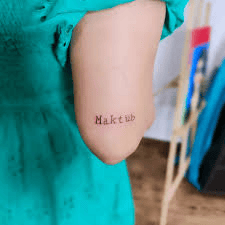Introduction — a small note before we begin
The phrase “maktub meaning” is a tiny pair of words with a lot of heart. Many people hear it and feel calm. Others get curious. In this article we will gently open the phrase. We will explain its roots, sense, and ways people use it today. We will give clear examples that any reader can follow. The tone is friendly. Sentences stay short. The goal is helpfulness. You will see the phrase “maktub meaning” used naturally. You will also find ideas to use the phrase in your life. By the end, the phrase will feel alive and useful.
What is “maktub” — a simple definition
“Maktub” is an Arabic word. It often shows up as a short phrase. In everyday speech people say it to mean “it is written” or “it was meant to be.” The idea is that some things come from a larger plan. Saying “maktub” can be a way to accept what happens. Many speakers use it with quiet calm. They do not mean defeat. They mean recognition. They see life as a story with pages already written. This gentle image helps explain the popular “maktub meaning” in simple terms.
The literal translation and how people read it
Literally, the phrase can be read as “it is written.” The root verb in Arabic points to writing or recording. In older times, writing was linked to record keeping and truth. So “it is written” suggests that something is noted down. When people ask for the “maktub meaning,” they often want both the literal and the feeling it carries. The literal line and the feeling work together. The word keeps both weight and softness. It tells us that life events may be recorded or guided by a larger order.
Arabic roots and language notes
The word comes from classical Arabic. It shares the same root as other words about writing. In Arabic grammar, the form used for “maktub” is passive. That makes the phrase point to what is done, not who did it. This grammar gives the word quiet strength. It allows the speaker to focus on the fact, not the agent. When people look up “maktub meaning,” they often want this little grammar clue. It helps them see why the phrase sounds both calm and final.
Cultural context — where the phrase lives
“Maktub” appears in many cultures that use Arabic or are influenced by Arabic speech. The phrase lives in spoken language, proverbs, and old stories. It also appears in modern books, songs, and films. People may use the word in many settings. Sometimes it is said in sorrow. Other times it is said in joy. The cultural use shapes the “maktub meaning” into more than a dictionary entry. It becomes a living habit of thought in many communities.
Religious and philosophical layers
In religious discussions, “maktub” can touch on big ideas. Words like “fate,” “divine will,” or “qadr” come up. Some readers link “maktub meaning” to the idea that a higher power may know or plan events. Others treat the phrase more loosely. They use it as a way to accept things they cannot change. The phrase does not demand belief in any single religion. It can sit beside belief, doubt, or curiosity. This flexibility is part of why many people find the phrase comforting.
Maktub in literature and popular culture
Writers like short, strong phrases. “Maktub” fits that need. It appears in novels, essays, and poems. One well-known modern use is in a popular novel where the phrase helps shape a story about dreams and journeys. Many readers who search “maktub meaning” come after seeing the word in a book. The word often carries a poetic glow when used by a storyteller. That glow helps the phrase travel across languages. It brings readers new to Arabic into a small, shared thought world.
Everyday speech — how people actually use it
People use “maktub” in casual talk too. Imagine a friend who loses a small chance. They might say “maktub” with a small smile. That short word can shrink worry. It can also help people move on. The everyday use of the word often mixes acceptance and hope. The phrase helps shift focus from blame to learning. Hearing the phrase can feel like closing a small loop. This everyday sense is a big part of the modern “maktub meaning.”
A reader’s story — connecting the idea to life
Many readers share small stories about “maktub” online. A student misses a job, then finds a better fit. A traveler misses a flight, then meets a friend in a cafe. In both cases, someone says “maktub” and feels a calm settle in. These small tales show how the phrase can act as a soft lens. It helps people make sense of chance. The personal stories people tell enrich the “maktub meaning.” They turn a word into a tool for everyday resilience.
Maktub vs similar words: kismet, fate, qadr
The word meets cousins in many tongues. In Turkish some say “kismet.” In English we say “fate” or “destiny.” In Arabic religious talk, “qadr” is often used. Each word holds its own shade. “Maktub” keeps a written-image. That image matters. When people compare them, they learn how small differences shift the feel. Knowing these neighbors helps when searching for the “maktub meaning.” It gives shades and choices, not a single answer.
How “maktub meaning” affects mindset and action
Some worry that words about fate make people passive. That is one view. But many users of the phrase say it can do the opposite. When people accept that some things are out of their hands, they can focus energy where it helps. The phrase can free someone from needless worry. When used well, it pairs acceptance with effort. You can say “maktub” and still try hard. The phrase becomes a balance between action and surrender. This balanced view is a core part of modern use and the “maktub meaning.”
Common criticisms and misunderstandings
Not everyone loves the idea behind “maktub.” Some fear it hides excuses. They worry people may stop trying. That is a valid concern. Words are tools. Tools can be used well or poorly. Saying “maktub” as a shield against responsibility is a misuse. A clearer understanding of the phrase helps avoid that trap. Teaching the phrase as both a comfort and a call to smart action keeps it healthy. This honest look helps readers weigh the “maktub meaning” in their own life.
Ways to use “maktub” in healthy practice
If you want to use the phrase, try it as a gentle check. Use it to let go of what you cannot change. Use it to calm fear after honest effort. Pair it with small steps forward. For example, say the phrase after you have tried and made a choice. Then, plan the next small move. This practice keeps you active and calm. Many people who study the “maktub meaning” find that habit helpful. It makes the phrase a practical tool, not just a saying.
Frequently Asked Questions
Q: Is “maktub” an Islamic word only?
No. The phrase has links to Arabic and to Islamic cultural circles. Still, people of many backgrounds use it. It appears in secular speech, songs, and books. When people ask about the “maktub meaning,” they often want both the cultural and literal sense. The word can be spiritual for some and poetic for others. It moves across groups like a useful image. That makes it broadly shared, not locked to a single faith.
Q: Does “maktub” mean you should not plan or work?
No. “Maktub” does not cancel planning or work. Many teachers of life balance say the phrase supports both effort and acceptance. The idea is simple. Try your best. Then accept what you cannot change. This approach reduces needless stress. When people explore the “maktub meaning,” they often find it helps them focus on what they can change. It frees energy for meaningful action without forcing rigid control.
Q: How is “maktub” different from “destiny”?
They are related. Both point to events beyond simple choice. But “maktub” holds a special written-image. It suggests a record that marks things as they happen. “Destiny” may sound broader and more abstract in English. When learners compare these words, they gain richer meaning. Studying “maktub meaning” alongside “destiny” helps readers find which image fits their heart.
Q: Can “maktub” help with grief or loss?
Yes for many people. Saying the phrase can bring a soft calm during grief. It does not erase pain. It simply offers a way to hold pain with another view. For some, “maktub” frames loss as part of a larger story. That frame can make healing feel less chaotic. Many counselors suggest phrases that give structure in grief. For some people “maktub” works like that. It gives a simple phrase to repeat when the world feels raw.
Q: Is “maktub” the same across Arabic dialects?
The core idea stays similar. But local speech can shade tone and use. In some places people use it more often in casual talk. In others it appears mostly in stories or poetry. The literal root is common across dialects. But the social weight can shift. When people research “maktub meaning,” they see both the shared core and local flavors. That variety keeps the word alive and flexible.
Q: How can I use “maktub” respectfully?
Use the phrase with care. Notice the setting and the people. If someone links the word to faith, honor that meaning. If you use it in casual talk, let it be simple and kind. Avoid using it as an excuse. Say it to comfort or to accept, not to dismiss responsibility. These small choices show respect. They also keep the phrase true to its deeper senses when people ask about the “maktub meaning.”
Conclusion — a small invitation
The “maktub meaning” carries both a literal line and a living feeling. It can be a quiet companion in hard times. It can be a warm light in small losses. It is not an order to stop trying. It is a word that helps hold life’s mystery. If you liked this guide, try one small experiment. Say the word the next time you face a closed door. Then notice if a new calm helps you choose what to do next. If you want, share a short story of your experience. I will help reflect on it with you.









